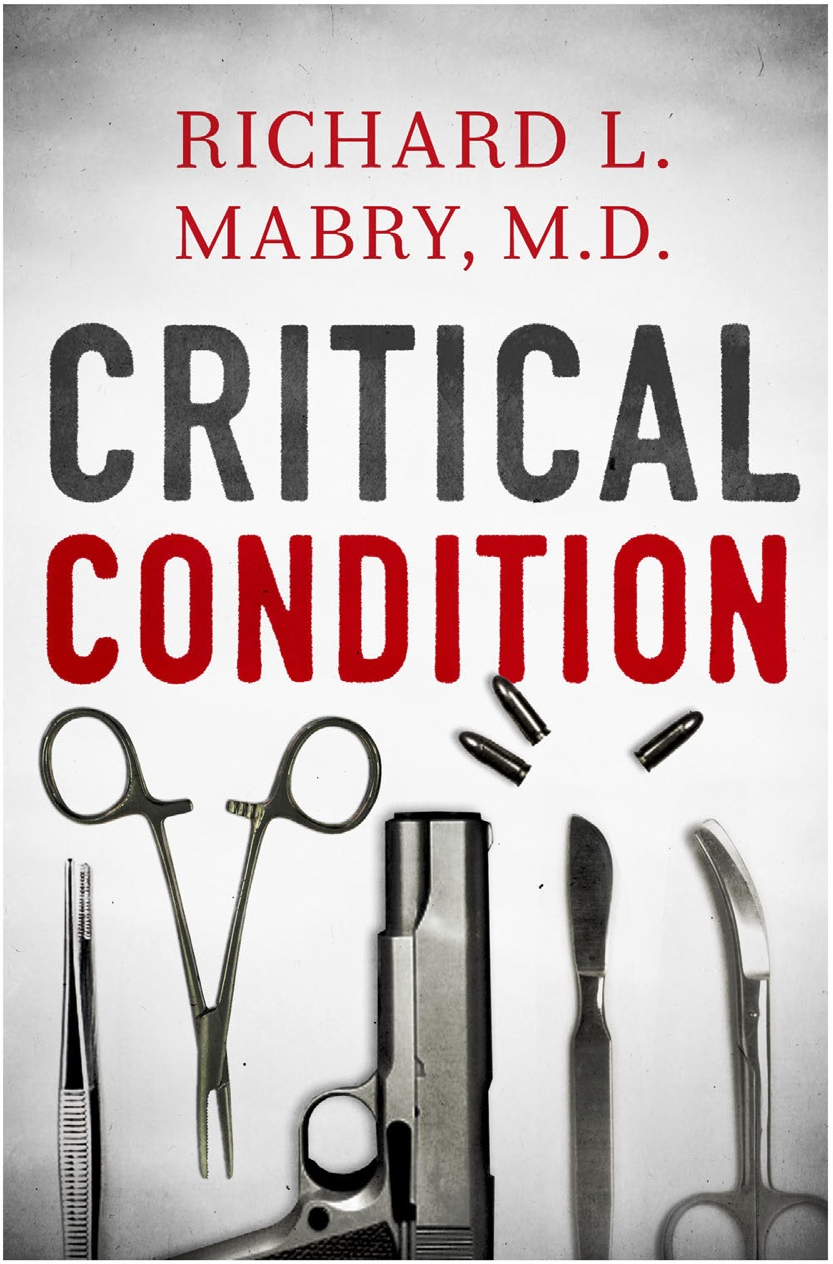 Richard Mabry graduated with a BA from the University of North Texas and an MD degree from the University of Texas Southwestern Medical School. He also served for almost three years as a Captain in the US Air Force.
Richard Mabry graduated with a BA from the University of North Texas and an MD degree from the University of Texas Southwestern Medical School. He also served for almost three years as a Captain in the US Air Force.
During the thirty-six years he spent in medicine, he wrote or edited eight textbooks, authored more than a hundred professional papers, and was an invited guest speaker all over the world. Now, a retired physician, he writes medical thrillers.
Dr. Mabry and his wife, Kay, live in North Texas.
Critical Condition (HarperCollins, April 2014) is your seventh novel. How have you changed as a writer in the past five years?
Oh, gracious, I hope I’ve learned along the way. I either wrote or completely rewrote four novels that were never published before my first contract, which goes along with what my cyber-friend editor Ray Rhamey says: it takes three or four books before an author begins to “get it.” In all my books, I tried to follow the rules about consistent point of view, avoidance of passive voice, guarding against the sagging middle—but after I’d written a few, I developed a sense of what “sounded right.” I’d found my “voice.”
Of course, I’ve learned a great deal about the publishing process along the way, but that’s a discussion for another day.
Great doctors are intuitive about their patients, just as great writers are intuitive about their characters. What other aspects of your career as a physician have been useful to writing fiction?
Doctors have to assess all the signs, symptoms, and test results and arrive at a judgment. If you turn that around, a suspense novelist must sprinkle clues along the way that lead to a conclusion. Although at an early writing class, Randy Ingermanson (a PhD and respected scientist) told me that my experience in scientific writing would be a hindrance rather than an asset, I think the analytical talents I developed have been helpful in writing suspense novels.
 Critical Condition releases today. Please tell us about it!
Critical Condition releases today. Please tell us about it!
My earlier books sprang from events in the news or in my own life. Critical Condition has some of my background in it as well, but to reveal what it is would be a huge spoiler. So I’ll just give you the back cover copy:
It was supposed to be a quiet dinner party with her colleagues, not the scene of a murder. But the shooting of a stranger on her front lawn is only the first in a string of events that have Dr. Shannon Frasier’s life teetering on the edge of chaos: She’s unable to make the deeper commitment her boyfriend deserves. Her sister shows up at Shannon’s home needing a place to stay, but with no promise she’ll stay clean and sober. And her father is diagnosed with cancer.
Then Shannon’s life stops teetering and plunges into the abyss. Because the person behind the guttural voice on the phone wants to know what the stranger said before he died. And he won’t stop until Shannon tells him what he wants to know–even if she doesn’t have it.
You write “suspense with heart.” Do your stories lean more toward suspense or romance, or do they balance between the two?
This actually came up on a conference call with the editorial staff at Thomas Nelson before I signed with them. They wanted to know if my work was 60% suspense, 40% romance, or vice-versa. I never really thought about it until then. I think on my work as “medical suspense with heart,” emphasis on suspense, but with just enough romance to keep things interesting. Combining all three elements into my novels is tough, but so far I’ve seemed to make it work.
Detours in life can be frustrating, but the outcome is often more intriguing than our original plan. Can you tell us about a recent “detour” in your life—or in one of your character’s lives—that taught you something?
There’s one major detour in my life that actually got me started on this road to writing. In 1999 my wife of forty years suffered a massive intracranial bleeding episode. Despite the best possible care at the teaching institution where I was a professor, after she’d spent two weeks in a coma I agreed to discontinue life support. My life didn’t detour—for a while it came to a complete halt. Then, through what can only be called God-directed circumstances, although I had no experience with non-medical writing, from that came The Tender Scar: Life After the Death of a Spouse. I’m proud of that book, but trying to write it sent me to my first writing conference where great mentors like Jim Bell and Alton Gansky gave me a push toward writing fiction. Since then, I’ve learned not to question what happens and just realize that God’s in control.
A few fun questions…
What’s the title of the last GREAT book you’ve read?
I’m rediscovering the writing of some suspense authors whose work I read years ago. Right now I’m in Dennis Lehane’s A Drink Before the War. Before that, I re-read Michael Connolly’s The Concrete Blonde. Wish I could write suspense like that. Are these great? Well, I wish I’d written them, which I think qualifies.
What’s your current favorite song on the radio or your mp3 player?
Would you believe I don’t listen to music on the radio anymore, and my mp3 player is in a drawer in my office somewhere? If I need music while I work (generally because my granddaughter is in the next room watching cartoons), I open Pandora on my computer and listen to The Mamas and The Papas, Simon & Garfunkel, even some of the Beatles. So I like 60’s music . . . so sue me.
What verse or story in the Bible best describes your faith journey?
I’ve adopted Psalm 139:1-5 as the verses with which I autograph my books. That passage reminds me that God knows everything about it, is a part of my life, directing it, even when I can’t see what’s next.
Thank you, Dr. Mabry! It’s nice to have you back at DivineDetour.
~ ~ ~
For more information about Dr. Mabry, visit his website.
To purchase Critical Condition and other books by Dr. Mabry, logon to:
Kathy, thanks for the opportunity to be here and interact with the readers of Divine Detour.
It’s great to have you here, Dr. Mabry!
Nice interview! I’ve been trying to find some new authors to follow and you’ve made my cut. I’m listening to one of yours, Stress Test, on CD right now, and it’s very good! pudy68 @ gmail dot com
Thanks for this opportunity to win your newest novel. It sounds like an exciting story. My email is momndad243 at yahoo dot com.
Love Richard’s books……anxious to read this one!
Thanks!
jacsmi75 at gmail dot com
I am a fan of Richard work. Thanks for the interview and the giveaway.
Shirley
sorry forgot to add my email: straitfromthehive(at)gmail(dot)com
HI,
Thanks for the interview. !!
North Texas ? awesome “Mean Green”
Go Eagles !
I too graduated from North Texas !
I live in the Dallas area and have worked in Health Care. Currently, I work for an International Health and Disability insurance company.
So when you write about UT Southwestern and the area around Dallas, I can identify.
I am enjoying all of your books.
bettyandjim123 at yahoo dot com
Thanks for all your comments and nice words. I hope you enjoy reading Critical Condition and my other novels of medical suspense.
Dr. Mabry has generously offered to give a book to one person who left a comment during the past week… and the winner selected at random is Polly. Congratulations, Polly! I will be in touch via email.
Thanks to all who left a comment for Dr. Mabry. I hope to see you again soon here at DivineDetour.
Have a blessed Easter.
Kathy